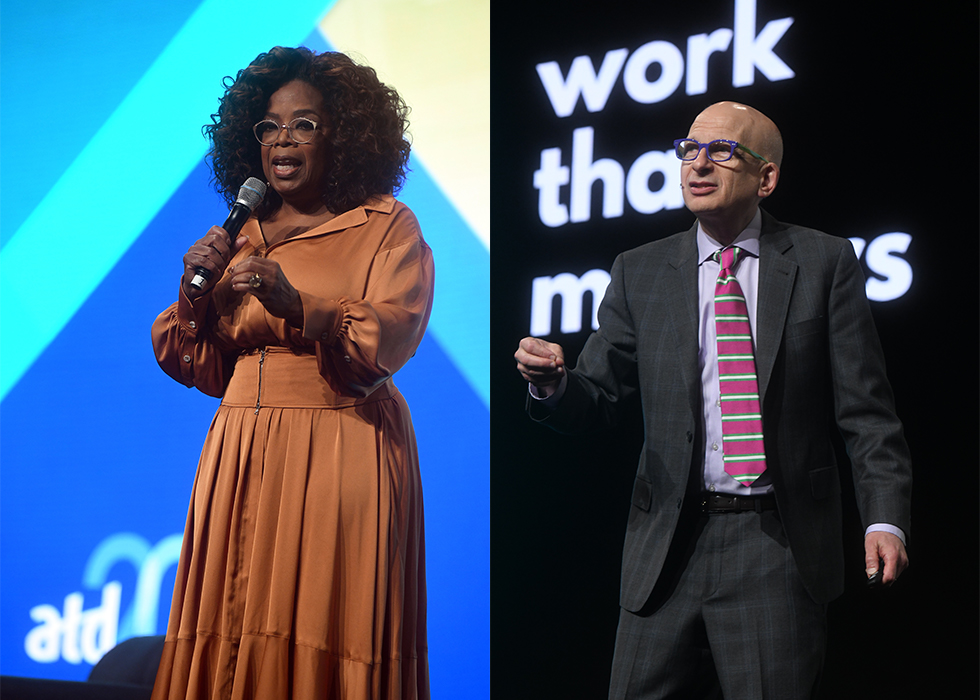
A common theme throughout the Association for Talent Development’s annual conference was leading for the future. Being a leader doesn’t always mean knowing the next step and exactly how to get there.
by Elizabeth Loutfi-Hipchen
May 28, 2019
What does it mean to be a good leader? Oprah Winfrey and Seth Godin will both tell you it has a lot to do with decision-making and being comfortable acknowledging the things you may not know. As two of the keynote speakers for this year’s ATD International Conference and Expo held May 19-22 in Washington D.C., Winfrey and Godin shared stories from their own lives as leaders and advised the 13,500 attendees to begin thinking alternatively about leadership roles.
“Leadership has to do with the choices you make,” Godin said during his Tuesday keynote. “The choice to show up and say, ‘I’m over here, and I am going to enroll on this journey, who wants to come with me?”
Godin is a New York-based speaker, author and blogger who empowers people in their professional arenas through his published books, workshops and seminars aimed at developing soft skills and putting a strong emphasis on humanity. “It’s not really about work, it’s about being human,” he said.
For decades, Winfrey has inspired people across the globe through her work in the media, as an actress and as a philanthropist. And she is still asking questions, every single day. Except she calls it truth-seeking, and she believes it’s the language each human being has in common.
“You and I are all looking for the same thing,” Winfrey said during her opening keynote on Monday morning. “You want what I want, I want what you want. And that is to be able to live out the truest expression of yourself as a human being.”
We are quick to assume that the ones holding leadership roles have already acquired all the knowledge they need and have complete certainty about which direction their business should go. However, what leaders don’t know yet, and the questions they need to answer, are, in fact, more impactful.
“We all have that natural instinct that tells you this way, that way or no way,” Winfrey said. “And I always say, if you don’t know what to do, do nothing. Get still until you actually know the answer. Because if you’ve ever been in a position where you have to constantly say, ‘what do you think?’ … it means you haven’t actually gotten clear on the answer for yourself.”
The ATD conference is a perfect place to do just that. We sat still in sessions that affirmed things we already know and humbled us by introducing us to the things we didn’t. Winfrey adheres to the concept of “a-ha” moments. She likens it to opening her blackout curtains every morning and looking out her window: “Every single day is an ‘a-ha’ moment,” she said.
Leaders especially shouldn’t shy away from these powerful moments at work because they indicate a need for change. Perhaps you recently decided you want to start tracking and analyzing new data that could be useful to your workplace, but were still unsure what specific data to collect, or even how. Panelists for a session on Monday called “The Future of Learning Data and Analytics” shared some of their own data tools and techniques (using programs such as PowerBI, Microsoft Excel and learning record sources) they’ve found useful in tracking learning and development.
The panel drew a large crowd of data-gathering experts and analytic rookie hopefuls all keen on discovering a useful tool or technique to bring back with them that could address an underlying question or problem in their workplace.
As an industry, learning and development is behind in data-collecting practices, said Megan Torrance, panelist and chief energy officer for TorranceLearning. She added that a lot of the things people in L&D want to do now — things like track diversity and inclusion in the workplace, and measure the response and conception of a learned skill — “sounds like it needs data.”
Data may not seem groundbreaking, but it can provide useful information later on, which is why you should collect it, said panelist host JD Dillon, chief learning architect of Axonify.
Halfway through his keynote speech, Godin tasked leaders with continuing to bring new ideas to the table every day, keeping in mind that they might not always work. Raising tough questions about what’s lacking in your workplace, or what could improve it, will go a long way.
“It is tempting to deny that this world is changing, but I hope we can agree that it is,” Godin said. “And you are on the front lines.”
Photos courtesy of Association for Talent Development.




